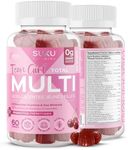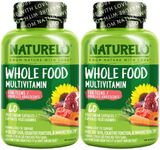Buying Guide for the Best Vitamin For Teens
Choosing the right vitamin for teens is important because this stage of life is full of growth and development. Teens have unique nutritional needs, and a good vitamin can help fill in any gaps that might be missing from their diet. When picking a vitamin, it's important to look at the ingredients, the form of the vitamin, and any additional features that might be helpful for a teen's lifestyle. Understanding the key specifications will help you make a choice that supports healthy growth, energy, and overall well-being.Nutrient ContentNutrient content refers to the specific vitamins and minerals included in the supplement, such as vitamin D, calcium, iron, B vitamins, and others. This is important because teens need certain nutrients more than others during their growth years. For example, calcium and vitamin D are crucial for bone development, while iron is important for energy and focus. When looking at nutrient content, check the label to see which nutrients are included and in what amounts. Some vitamins are basic and cover only the essentials, while others are more comprehensive and include a wider range of nutrients. If your teen has specific dietary gaps or health concerns, look for a vitamin that addresses those needs.
Dosage and Serving SizeDosage and serving size tell you how much of each nutrient is in a single serving and how many pills, gummies, or scoops are needed per day. This is important because you want to make sure your teen is getting enough of each nutrient without going over the recommended daily amount. Some vitamins require taking multiple pills or gummies, while others are just one a day. If your teen struggles with swallowing pills or remembering to take multiple doses, a once-daily option or a chewable form might be best.
Form of the VitaminVitamins for teens come in different forms, such as tablets, capsules, gummies, chewables, or powders. The form is important because it affects how easy and pleasant the vitamin is to take. Gummies and chewables are often more appealing to teens who dislike swallowing pills, but they may contain added sugars. Tablets and capsules usually have fewer extras but can be harder to swallow. Powders can be mixed into drinks for those who prefer not to take pills or gummies. Consider your teen's preferences and any dietary restrictions when choosing the form.
Allergen and Additive InformationThis specification covers whether the vitamin contains common allergens like gluten, dairy, soy, or nuts, as well as artificial colors, flavors, or preservatives. This is important for teens with allergies or sensitivities, or for families who prefer more natural products. Labels will usually state if a product is free from certain allergens or additives. If your teen has allergies or you want to avoid artificial ingredients, look for vitamins that are clearly labeled as allergen-free or made with natural ingredients.
Age and Gender SuitabilitySome vitamins are formulated specifically for certain age ranges or for boys or girls, as nutritional needs can differ. This is important because a vitamin designed for adults or younger children may not provide the right balance of nutrients for a teen. Check the label to make sure the vitamin is intended for teens, and if possible, for your teen's gender. This helps ensure your teen is getting the right nutrients in the right amounts for their stage of development.










